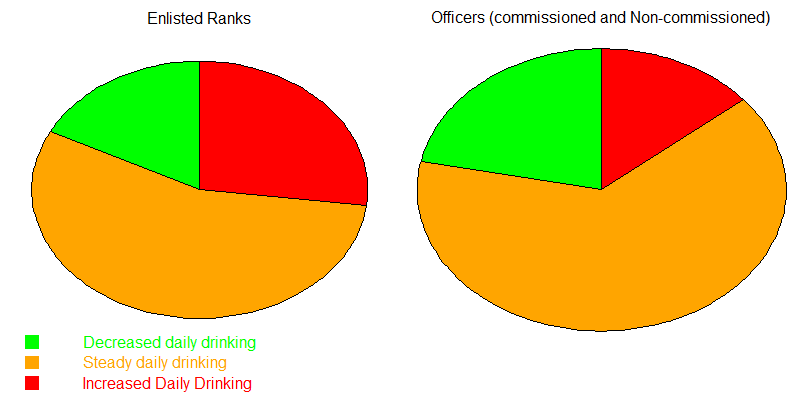The DRAM, Vol. 12(2) – Reasons for change: Alcohol use among veterans after deployment
Service members who experience combat are at heightened risk for heavy drinking after deployment.[1] Depending on their past history and their experiences during and after deployment, some veterans may be more at risk for drinking problems after deployment than others. This week, The DRAM reviews a study[2] by Trautmann and his colleagues that examined the drinking habits of German soldiers[3] both before and after deployment to Afghanistan.
What is the research question?
Are there factors (like previous traumatic life experience) that predict increased or decreased alcohol use after returning from deployment?
What did the researchers do?
Trautmann and his colleagues surveyed 358 male German soldiers who were deployed to Afghanistan. They spoke to the soldiers immediately before deployment and twelve months after return from deployment. They asked questions about the participants’ daily drinking before and after deployment, past psychological trauma and issues, difficulties during deployment, and quality of life upon returning from deployment. The researchers then used these data to test which factors were associated with decreased, steady, and increased daily drinking.
What did they find?
Trautmann and his colleagues found that enlisted participants (as opposed to non-commissioned and commissioned officers) had the highest risk for increased daily drinking after returning from deployment (see Figure 1). Those who had sleeping problems, less social support, and negative cognitions after deployment were also at high risk for increased daily drinking. Those who reported fewer PTSD symptoms before deployment were more likely to decrease their drinking.
Why do these findings matter?
Alcoholism is an issue among military veterans. This research could help by identifying which veterans might be most at risk. The armed forces and veterans’ organizations could focus especially on these at-risk veterans and help them avoid the harmful and painful consequences of alcoholism and other substance abuse disorders.
Every study has limitations. What about this one?
All of the participants were male, so the results may not be generalizable to female soldiers. Also, this sample was drawn solely from German soldiers involved in the mission in Afghanistan. The results may not be generalizable to other armed forces from other countries or on other deployments.
Figure 1. Pie charts displaying the proportions of enlisted ranks and officers who had decreased, stable, and increased daily drinking from before deployment to twelve months after return from deployment. Adapted from Trautmann et al. (2015).
For more information:
Websites such as Make the Connection and Inspiring Our Heroes provide information on support and treatment services available to U.S. veterans.
If you or a loved one struggles with drinking or related problems please visit our First Step to Change website available here.
— Matthew Tom
What do you think? Please use the comment link below to provide feedback on this article.
[1] Jacobson, I. G. (2008). Alcohol Use and Alcohol-Related Problems Before and After Military Combat Deployment. JAMA, 300(6), 663.
Russell, D. W., Russell, C. A., Riviere, L. A., Thomas, J. L., Wilk, J. E., & Bliese, P. D. (2014). Changes in alcohol use after traumatic experiences: The impact of combat on Army National Guardsmen. Drug and Alcohol Dependence, 139, 47–52.
[2] Trautmann, S., Schönfeld, S., Behrendt, S., Heinrich, A., Höfler, M., Siegel, S., … Wittchen, H.-U. (2015). Predictors of changes in daily alcohol consumption in the aftermath of military deployment. Drug and Alcohol Dependence, 147, 175–182.
[3] The soldiers were members of the International Security Assistance Force.
